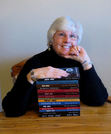Melissa Bowersock's Blog, page 18
November 1, 2014
Author Interview: Melody Clark
Today I’m sitting down with my friend Melody Clark to talk about her new book, Shamus Bead and the Cure for What Kills You. I read Melody’s first book, Shamus Bead and the Clockwork Resurrection Man and thoroughly enjoyed it. She was kind enough to let me get a sneak peek at the new book, and it’s just as good. The first book is available now (click on the book image below) and you can preorder the new book, which will be released on November 14.
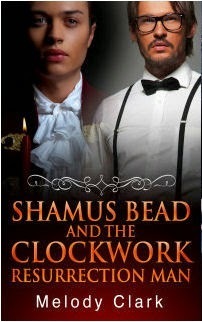
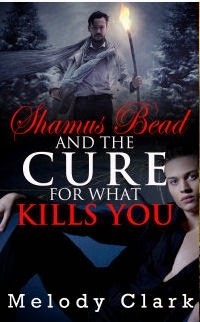
First off, can you give us a quick description of the Shamus books?
They are Victorian steampunk mysteries set in the London of Sherlock Holmes, with numerous knowing winks and nods to that subgenre. The two main characters, Professor Shamus Bead and medical Doctor Jeptha Lawton, are gay men in a relationship, which they must obviously keep hidden. They would be seen as deeply subversive people by the culture of the times, and yet they are the only ones who are ideally suited to face the plagues of those times, both literally and figuratively. Professor Bead is chief epidemiologist for the Royal Epidemiological Society. Doctor Lawton is his supervising partner. Their Moriarty is death and disease, which were rampant in Victorian England, due to pollution and many other factors.
At one point in my new novel, Shamus is asked what their number one enemy is and he says “ignorance.” In some ways, I don’t think the US has ever fully escaped the Victorian period. We’re a big country where ignorance can slip into small places and fester. Even though Shamus is based in the UK, we’re still fighting the same kind of nemeses here in our country now. We all repress parts of culture that are vital for us to thrive and survive. We never know where the cure for cancer will crop up. We need as many minds from as many different perspectives as possible. That’s also what Shamus addresses in theme and content.
You’ve created a very caring relationship between these two men, something uncommon now but even more so back in their time. What was it that inspired you to write so fully about these two very different men?
The central relationship is everything in novels. The characters have to care about each other in order for the reader to care about them and invest in their further adventures. Many fictional characters are clothed on the page – I mean, they exist as a kind of proper form of who those characters are. I wanted an honest depiction of their relationship. As Shamus emerged as a more graceful and delicate persona, Jeptha became even more of a strong and soldierly fellow in my mind. He had a protected young adulthood, in terms of growing up in English boarding schools, but he was still as preyed upon as Shamus was living in the streets. I wanted Jeptha to be a full partner, too. I didn’t want any Nigel Bruce dotty Watson interpretations being made. Shamus needs Jeptha as much, if not more, than Jeptha relies on Shamus.
How did you ever get the idea for this cross between Johnny Depp and Sherlock Holmes?
I wanted to write a Sherlock Holmes pastiche as I have had a deep love of the original stories since I was a child. The legal waters are murky for a Sherlock pastiche, so I set about creating my own character to honor that same tradition. Shamus Bead the name even suggests Sherlock Holmes. The name Jeptha Lawton is similar to John Watson. Shamus and Jeptha live on Orchard Street, which is the name of the street that Baker Street turns into. There are a few other touches that wink at the reader. But they are very different and unique characters.
As I’ve written him, Shamus has evolved into a much more fragile fellow than Holmes ever was. He is even more of an outcast in his own way. The more I wrote him, the more he became Johnny Depp-like in my mind in terms of the characters Depp plays – that same kind of deeply sensitive outsider with a poetic grace who must deal with the real world while speaking his own language. Bless them, characters have a life of their own. They will be what they will be, regardless of our wishes. They’re like children in that way.
I can vouch for the truth of that. Does Shamus or Jeptha ever surprise you?
All the time. One incident in the first novel involved a line where Shamus is chided by Jeptha for not bringing the right gun to a gunfight – as if Shamus would have any knowledge of guns. Shamus says something to the effect that next time he’ll bring his really big gun. Anyway, as I wrote the ending, I realized Shamus really did have a bigger gun – and I don’t mean that in a phallic sense – and he takes it out to use it. When Jeptha acts surprised at Shamus wielding the big gun, Shamus says to him, but I told you I had one. Jeptha replies, yes, but I thought you were joking. Well, so did I when I wrote the first scene, but Shamus surprised even me.
The books have a very authentic feel to them, both in the writing and in the descriptions of the areas of London. I particularly enjoyed the dialog, as well. What kind of research do you have to do for the period?
I’m a stickler for realism so I research tiny details. It’s important to me that the language be precise. Too many Holmes pastiches and novels in that tradition are written in a 21st century North American idiom. I also want to be accurate to the place and time. For the new novel, The Cure for What Kills You, I had to do a lot of research about the Victorian London Zoo for what amounts to one brief scene. I now know more than I ever wanted to know about the Bank of England too. :) But the mystery fans are very, very canny readers. They know if you have chops or not.
Do you have more adventures planned for Shamus?
At least three more. The next one will bring Shamus and Jeptha to the World’s Fair – the World’s Columbian Exposition in Chicago – or the White City, as it was called. The original idea was to link infamous Chicago serial killer H. H. Holmes to the Ripper, even though that had been done before, but the DNA test proving Jack the Ripper’s identity put the kibosh on that. My husband was born and raised in Chicago, in the area H. H. Holmes lived and worked in, so it was his suggestion. Now I’m having to regroup the idea around the propaganda war between Edison and Tesla, and the irrational nonsense Edison was bandying about to frighten people away from Tesla’s more visionary ideas. It’s a rich tapestry from which to draw.
Sounds like great fun and full of promise. I'll look forward to that! Tesla is actually very timely these days, so that will make for an interesting story.
You write across several genres and do both fiction and non-fiction. Do you have a favorite genre, style, or subject?
My father was a racist, I’m ashamed to say, so my siblings and I were sent to private schools to evade his noon day devil, namely busing. Due to this fact, I learned to read from McGuffey Readers, which are these 19th and 20th century primers created for elementary school learners. They consist of very serious English language literature – Milton, Byron, and the like. Partly because of that, I think, I evolved a sort of formal voice in a lot of my work, which has especially served me with Shamus, though I have radiated away from that in later stuff. I write what haunts me. I’ll become involved in a group of characters or a theme.
What’s your editing process?
My problem is I overedit. Pace in plotline is everything for me. I have written eight page scenes that I cut out to hasten the pace of the plot. My novels are quick reads because of it. I have learned to relax a little with my hacking and slashing of verbiage. This Shamus is a more robust novel than the first one. I then have a couple of beta readers whose work I greatly respect go over it for me. Beta readers keep writers from looking like silly putzes. Anyone who doesn’t use a beta reader is putting herself at a disadvantage.
I can heartily agree with that. Beta-readers save us from ourselves many times. I find that interesting that you would sacrifice so much for the pacing, but I also understand. Without pacing, even the best writing can flounder.
Do you design your own book covers or do you contract with a designer?
I select the images used, but I have a wonderful designer.
You publish under your own imprint. How did that develop?
I have published professionally in non-fiction and romance genres. I had two novels with an agent that couldn’t be placed for the same reason most aren’t placed these days – there is simply no market unless you have an established name. I had always written romance under pseudonyms. One friend with an established name had no trouble selling her work, but my friend Wendy Rathbone, a very fine writer, couldn’t place her manuscripts either. That kind of thing.
Anyway, I researched and became very wary of a lot of small electronic publishers. Many of the supposed companies are author mills that churn out product the way that some people list merchandise on Ebay. Post 100 listings, sell a certain percentage, turn a profit. When one of my editors at one of these small epublishers didn’t know a fairly obvious literary reference I used, I became even more concerned. Of course there are genuine epublishers with great reputations, but there are too many more that are nothing but scams preying on young authors. What I made on one of my epublished novels in a year amounted to what I have made self-publishing my very first title. Thus, Melody Clark Books was born. I named it that because I have a bad memory. :)
What kinds of books do you like to read?
I love mysteries, true crime, science fiction, horror, fantasy, etc. I’m a fairly eclectic reader. My Kindle TBR pile is legendary.
We all know how helpful reviews are, especially for indie writers. Do you reviews influence your own reading choices?
It all depends upon the reviewer. If I read a book a reviewer has recommended and don’t like it, I will seriously kick the tires on any other titles she or he praises. I’m very wary of the big review places. Too much covert marketing goes on there – people propping up their friends and knocking competitors. I generally advise friends to place little stock in reviews of that kind. I rarely believe any Amazon reviews on non-fiction, for instance. I’ll listen to the recommendations of my friends before any review.
What’s next for Melody Clark?
I’m starting work on a series I’m calling CARREFOURS, which may be a YA series. It’s about a system of villages that are self-sustaining, that generate their own power, food and other resources, that then become the target for big corporations trying to turn them back into consumers. My main female hero is a strong and resilient young woman named Shaysan. My hero, Abraham, is from a Kabalist settlement nearby. Fun ensues. :)
I’m also finishing up my sequel to A Room in the House of the Ancestors, which is about being an American in a post-American Exceptionalism era. It was inspired by my own genealogical research. I went in expecting the typical Heniz 57 conglomeration most Americans expect their history to entail. Aside from my Cherokee ancestry, I found something very different. Nearly all my non-NA lines led back to Great Britain. Of course, the melting pot of cultures that comprise Great Britain and Ireland goes without saying, but I had hoped for a recent Russian nobleman or a runaway slave or something exotic. All I saw was a genealogy filled with English, Irish, Scottish and Welsh people –– stereotypically American. My cousins include John Adams and Thomas Jefferson, for instance. If there’s such a thing as an Uber-Yank, it’s me.
So I began to think about what that means to be a British-American – and many, many of us are. We don’t even have cultural language for it. Brits don’t recognize us. Even Irish-Americans are later-period immigrant descendants. My Irish family came over here as early immigrants or Scots-Irish slaves. This is something that will become more and more an issue for us as the future unfolds. The ending of the first “A Room in the House of the Ancestors” completely changed on me – the main character, Eddie, was supposed to kill himself, as a kind of tragic commentary of learning the truth inside the lie. His family absolutely refused to let me dispatch him though. I kept coming up with dialogue – other writers will know how it is – where they made the case for Eddie’s survival. So the result has been a somewhat more sentimental universe than I had intended, but I’m having fun with it. Eddie Lives.
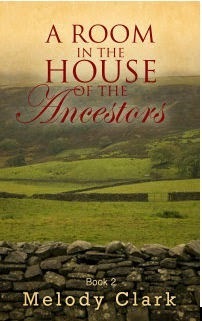
What would you like your readers to know about you?
That I write the best book of which I’m capable of at any time. A good book is in the eye of the beholder. Not everyone will like the same writers. But I do what I can with what I have.
Where can we find out more about you? Web: http://www.melodyclark.netBlog: http://melodyclarkbooks.wordpress.com/Facebook: https://www.facebook.com/melodyclark23Twitter: https://www.facebook.com/melodyclark23Amazon author page: http://www.amazon.com/Melody-Clark/e/B001HPYRB0


First off, can you give us a quick description of the Shamus books?
They are Victorian steampunk mysteries set in the London of Sherlock Holmes, with numerous knowing winks and nods to that subgenre. The two main characters, Professor Shamus Bead and medical Doctor Jeptha Lawton, are gay men in a relationship, which they must obviously keep hidden. They would be seen as deeply subversive people by the culture of the times, and yet they are the only ones who are ideally suited to face the plagues of those times, both literally and figuratively. Professor Bead is chief epidemiologist for the Royal Epidemiological Society. Doctor Lawton is his supervising partner. Their Moriarty is death and disease, which were rampant in Victorian England, due to pollution and many other factors.
At one point in my new novel, Shamus is asked what their number one enemy is and he says “ignorance.” In some ways, I don’t think the US has ever fully escaped the Victorian period. We’re a big country where ignorance can slip into small places and fester. Even though Shamus is based in the UK, we’re still fighting the same kind of nemeses here in our country now. We all repress parts of culture that are vital for us to thrive and survive. We never know where the cure for cancer will crop up. We need as many minds from as many different perspectives as possible. That’s also what Shamus addresses in theme and content.
You’ve created a very caring relationship between these two men, something uncommon now but even more so back in their time. What was it that inspired you to write so fully about these two very different men?
The central relationship is everything in novels. The characters have to care about each other in order for the reader to care about them and invest in their further adventures. Many fictional characters are clothed on the page – I mean, they exist as a kind of proper form of who those characters are. I wanted an honest depiction of their relationship. As Shamus emerged as a more graceful and delicate persona, Jeptha became even more of a strong and soldierly fellow in my mind. He had a protected young adulthood, in terms of growing up in English boarding schools, but he was still as preyed upon as Shamus was living in the streets. I wanted Jeptha to be a full partner, too. I didn’t want any Nigel Bruce dotty Watson interpretations being made. Shamus needs Jeptha as much, if not more, than Jeptha relies on Shamus.
How did you ever get the idea for this cross between Johnny Depp and Sherlock Holmes?
I wanted to write a Sherlock Holmes pastiche as I have had a deep love of the original stories since I was a child. The legal waters are murky for a Sherlock pastiche, so I set about creating my own character to honor that same tradition. Shamus Bead the name even suggests Sherlock Holmes. The name Jeptha Lawton is similar to John Watson. Shamus and Jeptha live on Orchard Street, which is the name of the street that Baker Street turns into. There are a few other touches that wink at the reader. But they are very different and unique characters.
As I’ve written him, Shamus has evolved into a much more fragile fellow than Holmes ever was. He is even more of an outcast in his own way. The more I wrote him, the more he became Johnny Depp-like in my mind in terms of the characters Depp plays – that same kind of deeply sensitive outsider with a poetic grace who must deal with the real world while speaking his own language. Bless them, characters have a life of their own. They will be what they will be, regardless of our wishes. They’re like children in that way.
I can vouch for the truth of that. Does Shamus or Jeptha ever surprise you?
All the time. One incident in the first novel involved a line where Shamus is chided by Jeptha for not bringing the right gun to a gunfight – as if Shamus would have any knowledge of guns. Shamus says something to the effect that next time he’ll bring his really big gun. Anyway, as I wrote the ending, I realized Shamus really did have a bigger gun – and I don’t mean that in a phallic sense – and he takes it out to use it. When Jeptha acts surprised at Shamus wielding the big gun, Shamus says to him, but I told you I had one. Jeptha replies, yes, but I thought you were joking. Well, so did I when I wrote the first scene, but Shamus surprised even me.
The books have a very authentic feel to them, both in the writing and in the descriptions of the areas of London. I particularly enjoyed the dialog, as well. What kind of research do you have to do for the period?
I’m a stickler for realism so I research tiny details. It’s important to me that the language be precise. Too many Holmes pastiches and novels in that tradition are written in a 21st century North American idiom. I also want to be accurate to the place and time. For the new novel, The Cure for What Kills You, I had to do a lot of research about the Victorian London Zoo for what amounts to one brief scene. I now know more than I ever wanted to know about the Bank of England too. :) But the mystery fans are very, very canny readers. They know if you have chops or not.
Do you have more adventures planned for Shamus?
At least three more. The next one will bring Shamus and Jeptha to the World’s Fair – the World’s Columbian Exposition in Chicago – or the White City, as it was called. The original idea was to link infamous Chicago serial killer H. H. Holmes to the Ripper, even though that had been done before, but the DNA test proving Jack the Ripper’s identity put the kibosh on that. My husband was born and raised in Chicago, in the area H. H. Holmes lived and worked in, so it was his suggestion. Now I’m having to regroup the idea around the propaganda war between Edison and Tesla, and the irrational nonsense Edison was bandying about to frighten people away from Tesla’s more visionary ideas. It’s a rich tapestry from which to draw.
Sounds like great fun and full of promise. I'll look forward to that! Tesla is actually very timely these days, so that will make for an interesting story.
You write across several genres and do both fiction and non-fiction. Do you have a favorite genre, style, or subject?
My father was a racist, I’m ashamed to say, so my siblings and I were sent to private schools to evade his noon day devil, namely busing. Due to this fact, I learned to read from McGuffey Readers, which are these 19th and 20th century primers created for elementary school learners. They consist of very serious English language literature – Milton, Byron, and the like. Partly because of that, I think, I evolved a sort of formal voice in a lot of my work, which has especially served me with Shamus, though I have radiated away from that in later stuff. I write what haunts me. I’ll become involved in a group of characters or a theme.
What’s your editing process?
My problem is I overedit. Pace in plotline is everything for me. I have written eight page scenes that I cut out to hasten the pace of the plot. My novels are quick reads because of it. I have learned to relax a little with my hacking and slashing of verbiage. This Shamus is a more robust novel than the first one. I then have a couple of beta readers whose work I greatly respect go over it for me. Beta readers keep writers from looking like silly putzes. Anyone who doesn’t use a beta reader is putting herself at a disadvantage.
I can heartily agree with that. Beta-readers save us from ourselves many times. I find that interesting that you would sacrifice so much for the pacing, but I also understand. Without pacing, even the best writing can flounder.
Do you design your own book covers or do you contract with a designer?
I select the images used, but I have a wonderful designer.
You publish under your own imprint. How did that develop?
I have published professionally in non-fiction and romance genres. I had two novels with an agent that couldn’t be placed for the same reason most aren’t placed these days – there is simply no market unless you have an established name. I had always written romance under pseudonyms. One friend with an established name had no trouble selling her work, but my friend Wendy Rathbone, a very fine writer, couldn’t place her manuscripts either. That kind of thing.
Anyway, I researched and became very wary of a lot of small electronic publishers. Many of the supposed companies are author mills that churn out product the way that some people list merchandise on Ebay. Post 100 listings, sell a certain percentage, turn a profit. When one of my editors at one of these small epublishers didn’t know a fairly obvious literary reference I used, I became even more concerned. Of course there are genuine epublishers with great reputations, but there are too many more that are nothing but scams preying on young authors. What I made on one of my epublished novels in a year amounted to what I have made self-publishing my very first title. Thus, Melody Clark Books was born. I named it that because I have a bad memory. :)
What kinds of books do you like to read?
I love mysteries, true crime, science fiction, horror, fantasy, etc. I’m a fairly eclectic reader. My Kindle TBR pile is legendary.
We all know how helpful reviews are, especially for indie writers. Do you reviews influence your own reading choices?
It all depends upon the reviewer. If I read a book a reviewer has recommended and don’t like it, I will seriously kick the tires on any other titles she or he praises. I’m very wary of the big review places. Too much covert marketing goes on there – people propping up their friends and knocking competitors. I generally advise friends to place little stock in reviews of that kind. I rarely believe any Amazon reviews on non-fiction, for instance. I’ll listen to the recommendations of my friends before any review.
What’s next for Melody Clark?
I’m starting work on a series I’m calling CARREFOURS, which may be a YA series. It’s about a system of villages that are self-sustaining, that generate their own power, food and other resources, that then become the target for big corporations trying to turn them back into consumers. My main female hero is a strong and resilient young woman named Shaysan. My hero, Abraham, is from a Kabalist settlement nearby. Fun ensues. :)
I’m also finishing up my sequel to A Room in the House of the Ancestors, which is about being an American in a post-American Exceptionalism era. It was inspired by my own genealogical research. I went in expecting the typical Heniz 57 conglomeration most Americans expect their history to entail. Aside from my Cherokee ancestry, I found something very different. Nearly all my non-NA lines led back to Great Britain. Of course, the melting pot of cultures that comprise Great Britain and Ireland goes without saying, but I had hoped for a recent Russian nobleman or a runaway slave or something exotic. All I saw was a genealogy filled with English, Irish, Scottish and Welsh people –– stereotypically American. My cousins include John Adams and Thomas Jefferson, for instance. If there’s such a thing as an Uber-Yank, it’s me.
So I began to think about what that means to be a British-American – and many, many of us are. We don’t even have cultural language for it. Brits don’t recognize us. Even Irish-Americans are later-period immigrant descendants. My Irish family came over here as early immigrants or Scots-Irish slaves. This is something that will become more and more an issue for us as the future unfolds. The ending of the first “A Room in the House of the Ancestors” completely changed on me – the main character, Eddie, was supposed to kill himself, as a kind of tragic commentary of learning the truth inside the lie. His family absolutely refused to let me dispatch him though. I kept coming up with dialogue – other writers will know how it is – where they made the case for Eddie’s survival. So the result has been a somewhat more sentimental universe than I had intended, but I’m having fun with it. Eddie Lives.

What would you like your readers to know about you?
That I write the best book of which I’m capable of at any time. A good book is in the eye of the beholder. Not everyone will like the same writers. But I do what I can with what I have.
Where can we find out more about you? Web: http://www.melodyclark.netBlog: http://melodyclarkbooks.wordpress.com/Facebook: https://www.facebook.com/melodyclark23Twitter: https://www.facebook.com/melodyclark23Amazon author page: http://www.amazon.com/Melody-Clark/e/B001HPYRB0
Published on November 01, 2014 15:07
October 25, 2014
BOO!
It's almost Halloween, time for ghosts and goblins to sneak out of the dark places they haunt. There's nothing like a good ghost story, a dark and stormy night and a hot cup of cocoa with whipped cream on top. Are you ready?

To celebrate, I've put my two ghost stories on sale for Kindle for just 99 cents each, through Halloween. Neither of them are your typical ghost stories, and they're not the least bit scary. I think you'll enjoy them.
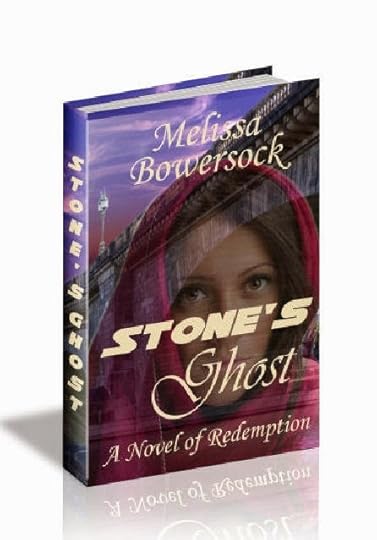
STONE'S GHOST
Matthew Stone doesn't believe in ghosts … until he meets one. He owns a successful business in Lake Havasu, Arizona, home to the famed London Bridge that was brought over stone by stone and rebuilt over the Colorado River. He has a gorgeous girlfriend, a doting mother, and more money than he needs, but no time for stories about the ghosts who were transplanted from England with the famed bridge. When a chance encounter with a female ghost leads to unexpected friendship, Matt and the ghost are forced to rely on each other as they confront the pasts that haunt them.
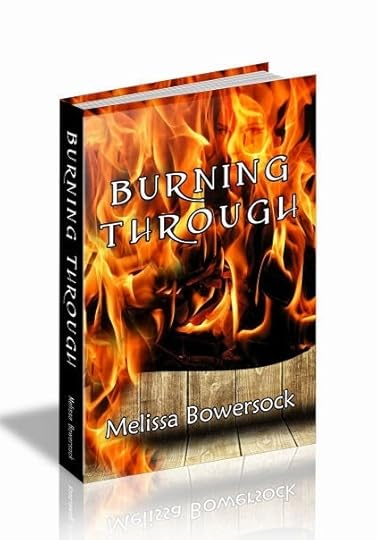
BURNING THROUGH
When Jennifer and Robert Stinson buy a beautifully restored Victorian house, the last thing they expect is to share their home with a ghost ― especially one with a penchant for setting fires. Unfortunately the ghostly arson only creates more tension in their already strained marriage. Jen launches her own investigation into the history of her house and discovers a surprising ally in a sympathetic fire captain. But can she unravel the mystery of the fires before they consume her home, her marriage … and her life?
Happy Halloween and happy reading!

To celebrate, I've put my two ghost stories on sale for Kindle for just 99 cents each, through Halloween. Neither of them are your typical ghost stories, and they're not the least bit scary. I think you'll enjoy them.

STONE'S GHOST
Matthew Stone doesn't believe in ghosts … until he meets one. He owns a successful business in Lake Havasu, Arizona, home to the famed London Bridge that was brought over stone by stone and rebuilt over the Colorado River. He has a gorgeous girlfriend, a doting mother, and more money than he needs, but no time for stories about the ghosts who were transplanted from England with the famed bridge. When a chance encounter with a female ghost leads to unexpected friendship, Matt and the ghost are forced to rely on each other as they confront the pasts that haunt them.

BURNING THROUGH
When Jennifer and Robert Stinson buy a beautifully restored Victorian house, the last thing they expect is to share their home with a ghost ― especially one with a penchant for setting fires. Unfortunately the ghostly arson only creates more tension in their already strained marriage. Jen launches her own investigation into the history of her house and discovers a surprising ally in a sympathetic fire captain. But can she unravel the mystery of the fires before they consume her home, her marriage … and her life?
Happy Halloween and happy reading!
Published on October 25, 2014 01:00
October 18, 2014
Resources for Writers
As a way of giving back, I decided I needed to add some writers' resources to my web page. Although there is plenty of advice on the web for newbies, it's pretty mixed as far as usefulness, plus it's scattered pretty widely. I wanted to distill the basics down to its purest form, creating a foundation from which new writers can then plumb the depths in other communities and forums across the web.
So, in that vein, I developed a Resources page on my web site. Please feel free to check it out. I talk quite a bit about my favorite place on the web, Indies Unlimited, plus giving some basic parameters about editing, formatting, cover design, publishing and promotion. I think for anyone just dipping their big toes into the water, this might be a good place to start. Then you can springboard off into the depths and gather more information that's applicable to your particular situation.
If you can think of anything I've missed, please let me know and I'll add it to the list. Remember, the writers' community online is all about cooperation, not competition.
High tide raises all boats.
So, in that vein, I developed a Resources page on my web site. Please feel free to check it out. I talk quite a bit about my favorite place on the web, Indies Unlimited, plus giving some basic parameters about editing, formatting, cover design, publishing and promotion. I think for anyone just dipping their big toes into the water, this might be a good place to start. Then you can springboard off into the depths and gather more information that's applicable to your particular situation.
If you can think of anything I've missed, please let me know and I'll add it to the list. Remember, the writers' community online is all about cooperation, not competition.
High tide raises all boats.
Published on October 18, 2014 16:25
October 9, 2014
Goodreads Giveaway - Fleischerhaus
Just a quick head's up. I've posted a giveaway on Goodreads for one paperback edition of my latest book, Fleischerhaus. If you'd like to enter, go here. The contest will end October 14. Good luck!
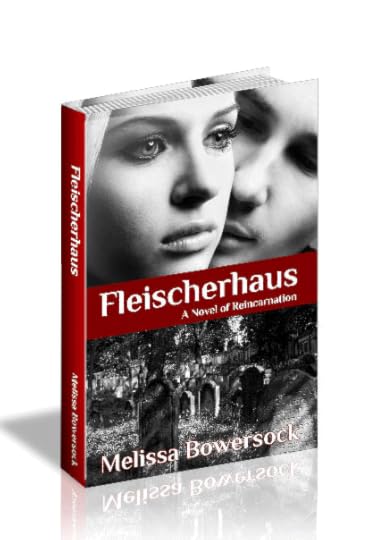 Julia Martin, newly-divorced but still reeling from her husband’s infidelity, takes a much needed vacation to visit old college friends in Germany. While touring a little-known concentration camp and museum, she spontaneously experiences a violent past life memory of being murdered in this very camp during the Holocaust. Efforts to understand her memories only lead to more questions, the largest being: is her killer still alive? Supported by her friends and comforted in the arms of a handsome doctor, Julia attempts to uncover the mysteries of her past life and find justice for the person she used to be.
Julia Martin, newly-divorced but still reeling from her husband’s infidelity, takes a much needed vacation to visit old college friends in Germany. While touring a little-known concentration camp and museum, she spontaneously experiences a violent past life memory of being murdered in this very camp during the Holocaust. Efforts to understand her memories only lead to more questions, the largest being: is her killer still alive? Supported by her friends and comforted in the arms of a handsome doctor, Julia attempts to uncover the mysteries of her past life and find justice for the person she used to be.
 Julia Martin, newly-divorced but still reeling from her husband’s infidelity, takes a much needed vacation to visit old college friends in Germany. While touring a little-known concentration camp and museum, she spontaneously experiences a violent past life memory of being murdered in this very camp during the Holocaust. Efforts to understand her memories only lead to more questions, the largest being: is her killer still alive? Supported by her friends and comforted in the arms of a handsome doctor, Julia attempts to uncover the mysteries of her past life and find justice for the person she used to be.
Julia Martin, newly-divorced but still reeling from her husband’s infidelity, takes a much needed vacation to visit old college friends in Germany. While touring a little-known concentration camp and museum, she spontaneously experiences a violent past life memory of being murdered in this very camp during the Holocaust. Efforts to understand her memories only lead to more questions, the largest being: is her killer still alive? Supported by her friends and comforted in the arms of a handsome doctor, Julia attempts to uncover the mysteries of her past life and find justice for the person she used to be.
Published on October 09, 2014 08:20
October 1, 2014
Unlimited - The Way to GO
Many of you may already be familiar with Kindle Unlimited. It's Amazon's newest idea: you pay $9.99 a month for an unlimited number of Kindle-format books. If you read voraciously, it's a heck of a deal. It's come in really handy for me since my husband recently discovered a western author he likes with a series of 30-something books! Even at a sales price of 99 cents each, there's no way that beats Kindle Unlimited.
And the best part is, you don't even need a Kindle to take advantage of this. Here are some frequently-asked questions about KU to explain.
On the heels of KU comes a new website devoted to KU books: ebooksunlimited.net. This is a new site that is collecting as many KU books as possible, submitted by the authors. Currently they have quite a few categories of fiction, non-fiction and children's books. What I particularly like is the fact that, when I submit a book to them, they ask a few behind-the-scenes interview questions and then post an excerpt. It's a great way to find more about books before you download them.
So far, I've got four of my books up on ebooksunlimited already.
Queen's Gold
Burning Through
Fleischerhaus
Marcia Gates: Angel of Bataan
If Kindle Unlimited sounds like a good deal to you, check it out. And once you've signed up for that, go to ebooksunlimited and check out the smorgasbord of books available to you. You won't be sorry!
And the best part is, you don't even need a Kindle to take advantage of this. Here are some frequently-asked questions about KU to explain.
On the heels of KU comes a new website devoted to KU books: ebooksunlimited.net. This is a new site that is collecting as many KU books as possible, submitted by the authors. Currently they have quite a few categories of fiction, non-fiction and children's books. What I particularly like is the fact that, when I submit a book to them, they ask a few behind-the-scenes interview questions and then post an excerpt. It's a great way to find more about books before you download them.
So far, I've got four of my books up on ebooksunlimited already.
Queen's Gold
Burning Through
Fleischerhaus
Marcia Gates: Angel of Bataan
If Kindle Unlimited sounds like a good deal to you, check it out. And once you've signed up for that, go to ebooksunlimited and check out the smorgasbord of books available to you. You won't be sorry!
Published on October 01, 2014 01:00
September 25, 2014
Last of the Birthday Sales
Well, the month has shot by like an errant cannon ball. How does that happen? I'm going to finish up my month of birthday sales with my only non-fiction, the biography of my aunt. This book, in Kindle format, will be only 99 cents through the end of September.
Marcia Gates: Angel of Bataan
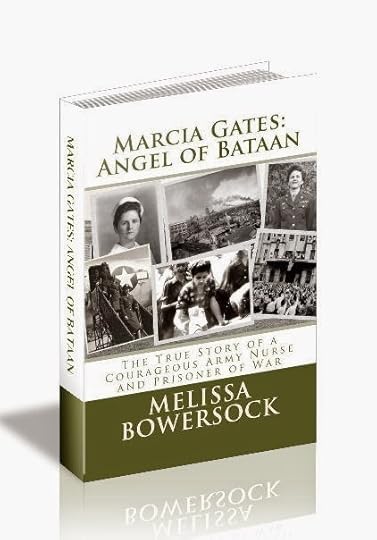
Marcia L. Gates was an Army nurse and prisoner of war during WWII. As an "Angel of Bataan," she spent three years in a Japanese internment camp in the Philippines. This is her story, told through her letters and the newspaper clippings, photos and letters collected by her mother. The book was awarded a biography medal by the Military Writers Society of America in 2012 and an Honorable Mention by the Hollywood Book Festival in 2013. It was also featured in the TV documentary, Our Wisconsin: Military History of America's Dairyland on WKOW-TV in Madison.
You can also see the book trailer here.And here is an interview I did on the Morning Scramble, talking about the book.This book is also available as an audio book, which adds a whole new dimension to the story.
I've been tremendously pleased and humbled by the way this book has continued to touch people. There are so many untold stories out there or people who lived through this extraordinary time, yet every year we lose more of them. I would strongly encourage anyone who has or knows a story about a family member like this to write it down. It's history we don't want to lose.
Marcia Gates: Angel of Bataan

Marcia L. Gates was an Army nurse and prisoner of war during WWII. As an "Angel of Bataan," she spent three years in a Japanese internment camp in the Philippines. This is her story, told through her letters and the newspaper clippings, photos and letters collected by her mother. The book was awarded a biography medal by the Military Writers Society of America in 2012 and an Honorable Mention by the Hollywood Book Festival in 2013. It was also featured in the TV documentary, Our Wisconsin: Military History of America's Dairyland on WKOW-TV in Madison.
You can also see the book trailer here.And here is an interview I did on the Morning Scramble, talking about the book.This book is also available as an audio book, which adds a whole new dimension to the story.
I've been tremendously pleased and humbled by the way this book has continued to touch people. There are so many untold stories out there or people who lived through this extraordinary time, yet every year we lose more of them. I would strongly encourage anyone who has or knows a story about a family member like this to write it down. It's history we don't want to lose.
Published on September 25, 2014 01:00
September 18, 2014
Birthday Celebration Continued ...
This is great fun to be able to give my friends, fans and readers presents when it's my birthday. I love sharing the celebration. This week, I'm turning to a couple of my romance novels. I've written several, both historical (western) and contemporary, so I decided to feature one of each. For this week, today through September 24, these will both be only 99 cents for Kindle. Take a look, see what you think, and if you're in the mood for a good romance, go for it!
Superstition Gold
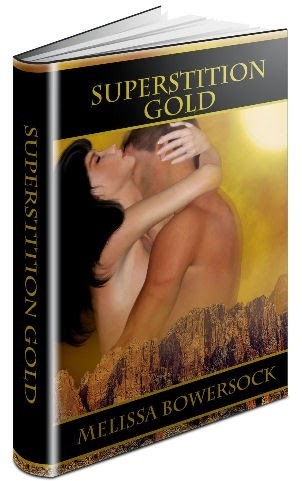
Married and widowed within a 24-hour period, beautiful Leigh Banning watches as her storybook New Orleans life crumbles away piece by piece. In a heartbroken attempt to start over, she travels to the wilds of frontier Arizona in an effort to understand the father she never knew and is rewarded with gold from the legendary Lost Dutchman gold mine in the Superstition Mountains. The gold comes with a price tag, however—the murder of innocent people. Leigh’s quest for justice leads her to a remote Apache camp in the company of a proud Pima Indian and a handsome cavalry officer. Torn between the fiery kisses of the Major and the respectful love of the Pima, Leigh joins forces with the Apaches to battle gold-hungry killers and in the process discovers her true self and her one true love.
Remember Me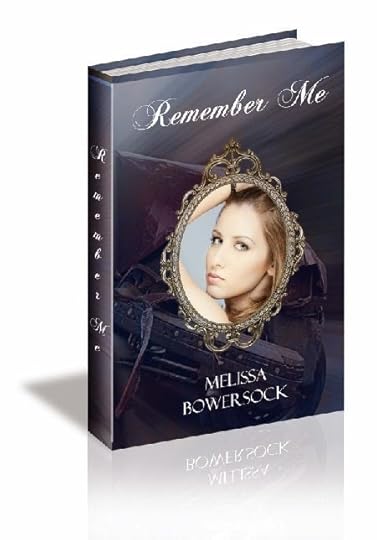
Elly Cole wakes up bruised and battered in a hospital-and has no idea who she is or how she got there. Her brooding giant of a husband informs her that she had been fleeing with her lover who was killed in the car accident that left her injured, that she is pregnant with that lover's child and that she has nowhere else to go but home-with him. Struggling against the threat of her husband's dangerous rage and jealousy, Elly strives to regain her memory and reconstruct the life she left behind, wondering how she could ever have loved this man who hates her.
I'll have one last special on September 25 to close out the month. Hope you've enjoyed the birthday sales!
Superstition Gold

Married and widowed within a 24-hour period, beautiful Leigh Banning watches as her storybook New Orleans life crumbles away piece by piece. In a heartbroken attempt to start over, she travels to the wilds of frontier Arizona in an effort to understand the father she never knew and is rewarded with gold from the legendary Lost Dutchman gold mine in the Superstition Mountains. The gold comes with a price tag, however—the murder of innocent people. Leigh’s quest for justice leads her to a remote Apache camp in the company of a proud Pima Indian and a handsome cavalry officer. Torn between the fiery kisses of the Major and the respectful love of the Pima, Leigh joins forces with the Apaches to battle gold-hungry killers and in the process discovers her true self and her one true love.
Remember Me

Elly Cole wakes up bruised and battered in a hospital-and has no idea who she is or how she got there. Her brooding giant of a husband informs her that she had been fleeing with her lover who was killed in the car accident that left her injured, that she is pregnant with that lover's child and that she has nowhere else to go but home-with him. Struggling against the threat of her husband's dangerous rage and jealousy, Elly strives to regain her memory and reconstruct the life she left behind, wondering how she could ever have loved this man who hates her.
I'll have one last special on September 25 to close out the month. Hope you've enjoyed the birthday sales!
Published on September 18, 2014 01:00
September 10, 2014
And the Birthday Celebration Goes on ...
To continue the birthday celebration for the month, I am putting my two ghost novels on sale for 99 cents each, through September 17. Okay, ghosts aren't generally associated with birthdays, but these novels, as well as being entertaining, just might have some very important ideas about living. If you like the paranormal, if you like good stories with satisfying endings, these are for you. And they are NOT scary. Don't worry; my ghosts won't keep you up at night except to keep turning the pages.
Stone's Ghost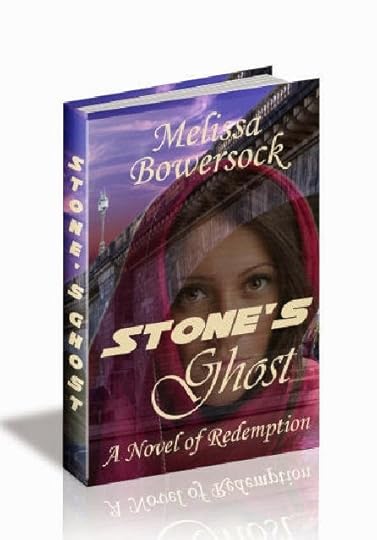
Matthew Stone doesn't believe in ghosts … until he meets one. He owns a successful business in Lake Havasu, Arizona, home to the famed London Bridge that was brought over stone by stone and rebuilt over the Colorado River. He has a gorgeous girlfriend, a doting mother, and more money than he needs, but no time for stories about the ghosts who were transplanted from England with the famed bridge. When a chance encounter with a female ghost leads to unexpected friendship, Matt and the ghost are forced to rely on each other as they confront the pasts that haunt them.
Burning Through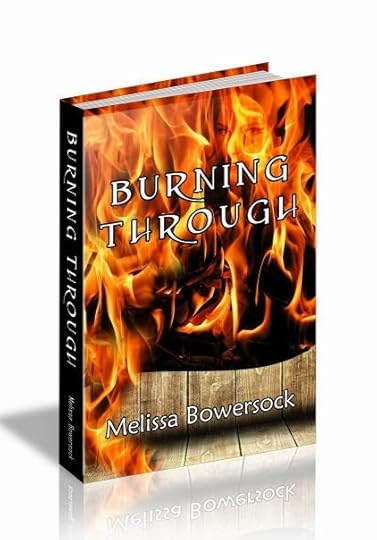
When Jennifer and Robert Stinson buy a beautifully restored Victorian house, the last thing they expect is to share their home with a ghost ― especially one with a penchant for setting fires. Unfortunately the ghostly arson only creates more tension in their already strained marriage. Jen launches her own investigation into the history of her house and discovers a surprising ally in a sympathetic fire captain. But can she unravel the mystery of the fires before they consume her home, her marriage … and her life?
Stone's Ghost

Matthew Stone doesn't believe in ghosts … until he meets one. He owns a successful business in Lake Havasu, Arizona, home to the famed London Bridge that was brought over stone by stone and rebuilt over the Colorado River. He has a gorgeous girlfriend, a doting mother, and more money than he needs, but no time for stories about the ghosts who were transplanted from England with the famed bridge. When a chance encounter with a female ghost leads to unexpected friendship, Matt and the ghost are forced to rely on each other as they confront the pasts that haunt them.
Burning Through

When Jennifer and Robert Stinson buy a beautifully restored Victorian house, the last thing they expect is to share their home with a ghost ― especially one with a penchant for setting fires. Unfortunately the ghostly arson only creates more tension in their already strained marriage. Jen launches her own investigation into the history of her house and discovers a surprising ally in a sympathetic fire captain. But can she unravel the mystery of the fires before they consume her home, her marriage … and her life?
Published on September 10, 2014 21:49
September 3, 2014
Birthday Gifts for ALL!
September is my birthday month, and I've gotten into the habit of giving birthday gifts to my readers. This year is no different, so to kick off the month I'm offering my two novels about reincarnation at just 99 cents for the Kindle version.
The first is my latest book, Fleischerhaus. I've categorized it as a paranormal/suspense/romance, as it has all three element woven into the story.
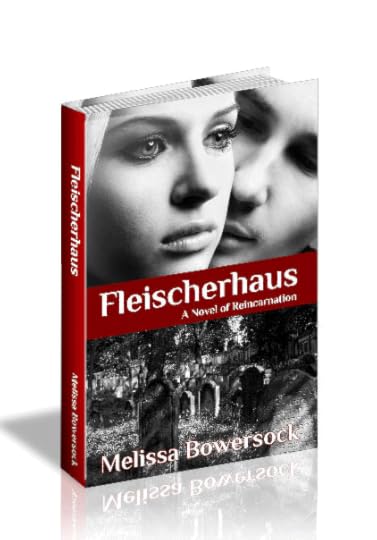 Julia Martin, newly-divorced but still reeling from her husband’s infidelity, takes a much needed vacation to visit old college friends in Germany. While touring a little-known concentration camp and museum, she spontaneously experiences a violent past life memory of being murdered in this very camp during the Holocaust. Efforts to understand her memories only lead to more questions, the largest being: is her killer still alive? Supported by her friends and comforted in the arms of a handsome doctor, Julia attempts to uncover the mysteries of her past life and find justice for the person she used to be.
Julia Martin, newly-divorced but still reeling from her husband’s infidelity, takes a much needed vacation to visit old college friends in Germany. While touring a little-known concentration camp and museum, she spontaneously experiences a violent past life memory of being murdered in this very camp during the Holocaust. Efforts to understand her memories only lead to more questions, the largest being: is her killer still alive? Supported by her friends and comforted in the arms of a handsome doctor, Julia attempts to uncover the mysteries of her past life and find justice for the person she used to be.
The second is my earlier novel about reincarnation, Queen's Gold. This one is actually an action/adventure, quite a bit more of a wild ride.
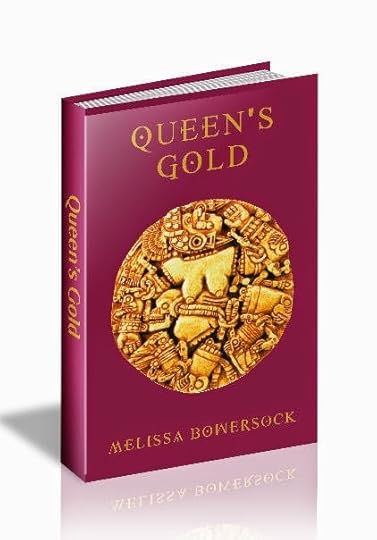
Hal Thompson is a pretty ordinary guy. A widower who owns his own small business, he’s doing his best to raise his two nearly adult children alone. When they convince him to undergo a hypnotic past-life regression, he is unimpressed that his “memories” reveal the hiding place of ancient Aztec gold. Other people, however, take it very seriously and when his family is threatened, he is forced to plunge into the jungles of Mexico, battling treacherous terrain, lethal wildlife and the haunting feeling of a love that spans centuries. Can he find the gold before it claims more lives? Or will he lose the love of his life … again?
So if you've wondered about reincarnation, if you've thought these books looked interesting, now is the time to grab 'em. They'll be 99 cents through September 10.
Enjoy.
The first is my latest book, Fleischerhaus. I've categorized it as a paranormal/suspense/romance, as it has all three element woven into the story.
 Julia Martin, newly-divorced but still reeling from her husband’s infidelity, takes a much needed vacation to visit old college friends in Germany. While touring a little-known concentration camp and museum, she spontaneously experiences a violent past life memory of being murdered in this very camp during the Holocaust. Efforts to understand her memories only lead to more questions, the largest being: is her killer still alive? Supported by her friends and comforted in the arms of a handsome doctor, Julia attempts to uncover the mysteries of her past life and find justice for the person she used to be.
Julia Martin, newly-divorced but still reeling from her husband’s infidelity, takes a much needed vacation to visit old college friends in Germany. While touring a little-known concentration camp and museum, she spontaneously experiences a violent past life memory of being murdered in this very camp during the Holocaust. Efforts to understand her memories only lead to more questions, the largest being: is her killer still alive? Supported by her friends and comforted in the arms of a handsome doctor, Julia attempts to uncover the mysteries of her past life and find justice for the person she used to be.
The second is my earlier novel about reincarnation, Queen's Gold. This one is actually an action/adventure, quite a bit more of a wild ride.

Hal Thompson is a pretty ordinary guy. A widower who owns his own small business, he’s doing his best to raise his two nearly adult children alone. When they convince him to undergo a hypnotic past-life regression, he is unimpressed that his “memories” reveal the hiding place of ancient Aztec gold. Other people, however, take it very seriously and when his family is threatened, he is forced to plunge into the jungles of Mexico, battling treacherous terrain, lethal wildlife and the haunting feeling of a love that spans centuries. Can he find the gold before it claims more lives? Or will he lose the love of his life … again?
So if you've wondered about reincarnation, if you've thought these books looked interesting, now is the time to grab 'em. They'll be 99 cents through September 10.
Enjoy.
Published on September 03, 2014 15:07
August 26, 2014
Author Interview: Laurie Boris
Since my buddy Laurie Boris lives on the east coast and I live in the west, I’ve arranged to have my personal jet pick her up and circle us lazily over the country as we chat. We’re in the forward living room, each in a 10-way recliner with a large window so we can watch the world glide by. My crew brings us mimosas and baklava and we’re all set.
First of all, Laurie, tell us about your latest book, Playing Charlie Cool.
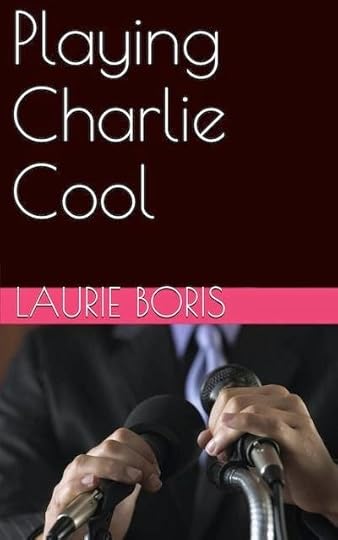
Thanks for the first-class treatment, Melissa! Playing Charlie Cool explores the utter frustration of two men trying to stay together when it feels like the whole world is conniving to drive them apart.
Three months after leaving his wife and coming out to the New York press, Joshua Goldberg, heir-apparent to a political dynasty, is still reluctant to make his relationship with television producer Charlie Trager public. Charlie, a patient man, is trying his hardest to be supportive through an ugly divorce and Joshua’s flirtation with the political spotlight. But there’s only so much Charlie can take and only so long he can sit on the sidelines and watch the man he loves crumble from the strain.
It’s available now for pre-ordering from Amazon and I expect to publish no later than October 8.
Now, I need to confess, I have not read all your books. I did read this latest one and The Pictureof Cool, subtitled Trager Family Secrets Book 1, and I know they have the same characters. Your book Don’t Tell Anyone issubtitled Trager Family Secrets Book 2,but it seems it has a different cast of characters. Do the characters figure into all three books?
There’s an overlap in the characters, but the focus is a little different. Don’t Tell Anyonesets old-school Jewish mother Estelle Trager against Liza, her modern daughter-in-law, when the family discovers the older woman has breast cancer. Liza navigates between husband Adam and brother-in-law Charlie when they all disagree about what’s best for Mom, stirring up old secrets and sibling rivalries. With novella The Picture of Cool and sequel Playing Charlie Cool, we move into Charlie’s perspective, into his life in Manhattan. It’s a sort of sideways trilogy, although Don’t Tell Anyone and Playing Charlie Coolare standalone stories. Liza, who is also Charlie’s best friend, appears in all three books. Probably the most controversial element in the Cool stories is the fact that the main characters are gay men. I know you’re married and straight, so how did you choose to write about gay men?
Charlie chose me. That’s how it started. He’s such a great character, and ever since he popped up in Don’t Tell Anyone, I’ve wanted to know more about his life and his off-camera attraction to a closeted, married politician. Charlie moved into my writing room, poured a glass of virtual scotch, and started telling a story. I really started resonating with him. With empathy and compassion, I think writers can take on so many types of characters, so many points of view. I’ve also seen the anguish that some friends and acquaintances have gone through, either by denying who they are or telling loved ones who were not accepting. For a long time, I’ve wanted to explore this in fiction, with the right characters and the right story. Not to preach or with an agenda, but just to understand.
What kinds of responses have you gotten from readers about the sexuality of your characters?
I have sensed the silence from some quarters, but on the whole, readers have been very supportive and open. That’s what I try to focus on. One response I loved came from a reviewer who appreciated that Charlie and his friends play basketball. “Yes,” he wrote. “Gay men play sports.”
Great response! Personally, I just want to say that I felt you handled that particular hot potato in a very respectful, realistic and sympathetic way. The characters are mature, thoughtful men who are dealing with personal and career issues as all of us do. They want no more than meaningful work, to be productive and successful in their lives, and to have a loving and supportive family, and I enjoyed reading about them and how they faced their challenges. Good job!
Thank you, Melissa. I’ve enjoyed getting to know these men, meeting their friends and families, and earning their trust. It always astounds me how “real” these characters become when I’m writing them.
My crew is bringing in the 3-course breakfast for us, so while they’re doing that, let’s switch gears. I’d like to talk about editing, which you also do when you’re not writing books. How did you get into the editing business?
Editing came before the fiction writing. I was pretty good at typo hunting; in college I made laundry money proofreading friends’ papers. At my various jobs, I’d become the “last stop” to check for errors before anything went out the door. It felt like a natural progression.
What’s your background and experience in editing?
I have a background in advertising, journalism, and marketing going back decades. When I began writing fiction in the late 1980s, it brought me into a community of writers, and I often critiqued and proofread manuscripts informally for them. After getting laid off from a full-time marketing job in 2005, I moved into freelance writing and editing, gaining more professional experience.
Of the three types of editing (proofreading for typos; copy editing for spelling, grammar, punctuation, etc.; developmental editing for structure, story arc, consistency, character development) do you have a preference for what you’d rather concentrate on?
Although I’ve run the spectrum, my preference at the moment is copyediting. I love the logic of it, that it’s partly rules designed for clarity and partly the art of expression. When I’m at my computer, the Chicago Manual of Style is always within arm’s reach.
If you’re editing a book through all phases (above), how many passes might you make through the entire book? I know when I edit my own work, I have to go through at least once for just formatting, once for typos, once for content. If I try to look at too many things at one time, I get off track and miss things. What’s your process for this?
I go through a manuscript at least twice. Once for content, marking up any small things I find and flagging questions for later. Then a more thorough read for typos, consistency, punctuation, grammar, flow, and to see if those questions I had originally were answered. I read aloud during one of the passes to catch anything that doesn’t sound right. Reading aloud also helps catch errors like misused homophones or missing words. I write up detailed notes. Sometimes, if the edits are extensive, I’ll do a proofreading pass after the author has revised the manuscript.
What are the most common editing mistakes new writers make?
Most of the mistakes I see stem from a writer’s not yet having full confidence in his or her work. That means leaning too hard to make a point; for example, showing that someone is angry via body language and/or dialogue and then STATING that the character is angry. We get it. New writers often overload dialogue tags with adverbs (“she said emphatically”) or pile on the adjectives when they’re not needed. Learning what to pare away comes with experience and with finding a voice. It can also come down to the basics of the craft that we should all know: how to use punctuation, when to use affect/effect and other tricky pairings, for example.
Excellent advice, and I agree totally. I think new writers do tend to go overboard, just because they aren't sure they're getting their point across. With confidence comes economy of words. If a writer were looking for an editor, what should they look for? What questions should they ask the prospective editor?
Try to get a good idea of what kind of editing you’re looking for, first off, and know what the three (sometimes four) levels entail. That could shorten the conversation. If an editor does not know what kind of editing he or she does, odds are you might need to keep shopping. Ask about experience, particularly with your genre. Don’t be afraid to ask questions. You’re making an investment in your writing business and you should be clear about what you’re getting. While it’s not required that the editor be your BFF, a good working relationship is helpful. See how the communication goes. Are you satisfied with the responses? Does that particular editor seem to “get it”? You’ll be working closely together and it helps if your styles are a good fit.
We all have our weaknesses when it comes to writing, and I won’t ask yours, but I’d like to know if, with your experience, do you see yours quickly when you write? Do you recognize your own weaknesses as soon as you set them down, or do you still need (like most of us do) someone else to point them out to you?
Oh, that’s funny. I see some of my weakness when I’m writing. Some, I don’t see until the manuscript sits a while. I’ve written frequently in various blog posts about how our brains trick us into skimming over errors and how hard it is to see your own work objectively. When I submitted Playing Charlie Cool to David Antrobus for copyediting (yes, editors hire editors), I immediately learned that I have a serious “just” problem. Sometimes it really does take a pair of fresh eyes!
Anything else you’d like to add?
Thank you for your hospitality, Melissa, and the baklava!
Thanks so much, Laurie, for all the great advice. We’re just about to land, so it’s time to wrap this up. How can readers connect with you and where can they get your books?
I love hearing from readers! Here are a few places you can find me.Amazon: http://www.amazon/author/laurieborisFacebook: http://www.facebook.com/laurie.boris.authorTwitter: http://www.twitter.com/LaurieBorisSmashwords: http://www.smashwords.com/profile/view/LaurieBorisWebsite: http://laurieboris.comQuestions about editing: http://laurieboris.com/contact_laurieGoodreads: https://www.goodreads.com/author/show/4824645.Laurie_Boris
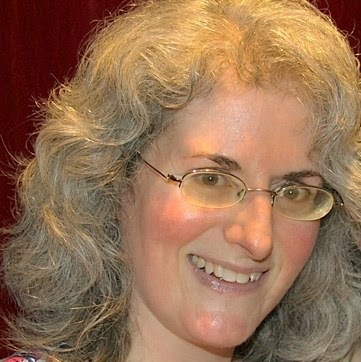
First of all, Laurie, tell us about your latest book, Playing Charlie Cool.

Thanks for the first-class treatment, Melissa! Playing Charlie Cool explores the utter frustration of two men trying to stay together when it feels like the whole world is conniving to drive them apart.
Three months after leaving his wife and coming out to the New York press, Joshua Goldberg, heir-apparent to a political dynasty, is still reluctant to make his relationship with television producer Charlie Trager public. Charlie, a patient man, is trying his hardest to be supportive through an ugly divorce and Joshua’s flirtation with the political spotlight. But there’s only so much Charlie can take and only so long he can sit on the sidelines and watch the man he loves crumble from the strain.
It’s available now for pre-ordering from Amazon and I expect to publish no later than October 8.
Now, I need to confess, I have not read all your books. I did read this latest one and The Pictureof Cool, subtitled Trager Family Secrets Book 1, and I know they have the same characters. Your book Don’t Tell Anyone issubtitled Trager Family Secrets Book 2,but it seems it has a different cast of characters. Do the characters figure into all three books?
There’s an overlap in the characters, but the focus is a little different. Don’t Tell Anyonesets old-school Jewish mother Estelle Trager against Liza, her modern daughter-in-law, when the family discovers the older woman has breast cancer. Liza navigates between husband Adam and brother-in-law Charlie when they all disagree about what’s best for Mom, stirring up old secrets and sibling rivalries. With novella The Picture of Cool and sequel Playing Charlie Cool, we move into Charlie’s perspective, into his life in Manhattan. It’s a sort of sideways trilogy, although Don’t Tell Anyone and Playing Charlie Coolare standalone stories. Liza, who is also Charlie’s best friend, appears in all three books. Probably the most controversial element in the Cool stories is the fact that the main characters are gay men. I know you’re married and straight, so how did you choose to write about gay men?
Charlie chose me. That’s how it started. He’s such a great character, and ever since he popped up in Don’t Tell Anyone, I’ve wanted to know more about his life and his off-camera attraction to a closeted, married politician. Charlie moved into my writing room, poured a glass of virtual scotch, and started telling a story. I really started resonating with him. With empathy and compassion, I think writers can take on so many types of characters, so many points of view. I’ve also seen the anguish that some friends and acquaintances have gone through, either by denying who they are or telling loved ones who were not accepting. For a long time, I’ve wanted to explore this in fiction, with the right characters and the right story. Not to preach or with an agenda, but just to understand.
What kinds of responses have you gotten from readers about the sexuality of your characters?
I have sensed the silence from some quarters, but on the whole, readers have been very supportive and open. That’s what I try to focus on. One response I loved came from a reviewer who appreciated that Charlie and his friends play basketball. “Yes,” he wrote. “Gay men play sports.”
Great response! Personally, I just want to say that I felt you handled that particular hot potato in a very respectful, realistic and sympathetic way. The characters are mature, thoughtful men who are dealing with personal and career issues as all of us do. They want no more than meaningful work, to be productive and successful in their lives, and to have a loving and supportive family, and I enjoyed reading about them and how they faced their challenges. Good job!
Thank you, Melissa. I’ve enjoyed getting to know these men, meeting their friends and families, and earning their trust. It always astounds me how “real” these characters become when I’m writing them.
My crew is bringing in the 3-course breakfast for us, so while they’re doing that, let’s switch gears. I’d like to talk about editing, which you also do when you’re not writing books. How did you get into the editing business?
Editing came before the fiction writing. I was pretty good at typo hunting; in college I made laundry money proofreading friends’ papers. At my various jobs, I’d become the “last stop” to check for errors before anything went out the door. It felt like a natural progression.
What’s your background and experience in editing?
I have a background in advertising, journalism, and marketing going back decades. When I began writing fiction in the late 1980s, it brought me into a community of writers, and I often critiqued and proofread manuscripts informally for them. After getting laid off from a full-time marketing job in 2005, I moved into freelance writing and editing, gaining more professional experience.
Of the three types of editing (proofreading for typos; copy editing for spelling, grammar, punctuation, etc.; developmental editing for structure, story arc, consistency, character development) do you have a preference for what you’d rather concentrate on?
Although I’ve run the spectrum, my preference at the moment is copyediting. I love the logic of it, that it’s partly rules designed for clarity and partly the art of expression. When I’m at my computer, the Chicago Manual of Style is always within arm’s reach.
If you’re editing a book through all phases (above), how many passes might you make through the entire book? I know when I edit my own work, I have to go through at least once for just formatting, once for typos, once for content. If I try to look at too many things at one time, I get off track and miss things. What’s your process for this?
I go through a manuscript at least twice. Once for content, marking up any small things I find and flagging questions for later. Then a more thorough read for typos, consistency, punctuation, grammar, flow, and to see if those questions I had originally were answered. I read aloud during one of the passes to catch anything that doesn’t sound right. Reading aloud also helps catch errors like misused homophones or missing words. I write up detailed notes. Sometimes, if the edits are extensive, I’ll do a proofreading pass after the author has revised the manuscript.
What are the most common editing mistakes new writers make?
Most of the mistakes I see stem from a writer’s not yet having full confidence in his or her work. That means leaning too hard to make a point; for example, showing that someone is angry via body language and/or dialogue and then STATING that the character is angry. We get it. New writers often overload dialogue tags with adverbs (“she said emphatically”) or pile on the adjectives when they’re not needed. Learning what to pare away comes with experience and with finding a voice. It can also come down to the basics of the craft that we should all know: how to use punctuation, when to use affect/effect and other tricky pairings, for example.
Excellent advice, and I agree totally. I think new writers do tend to go overboard, just because they aren't sure they're getting their point across. With confidence comes economy of words. If a writer were looking for an editor, what should they look for? What questions should they ask the prospective editor?
Try to get a good idea of what kind of editing you’re looking for, first off, and know what the three (sometimes four) levels entail. That could shorten the conversation. If an editor does not know what kind of editing he or she does, odds are you might need to keep shopping. Ask about experience, particularly with your genre. Don’t be afraid to ask questions. You’re making an investment in your writing business and you should be clear about what you’re getting. While it’s not required that the editor be your BFF, a good working relationship is helpful. See how the communication goes. Are you satisfied with the responses? Does that particular editor seem to “get it”? You’ll be working closely together and it helps if your styles are a good fit.
We all have our weaknesses when it comes to writing, and I won’t ask yours, but I’d like to know if, with your experience, do you see yours quickly when you write? Do you recognize your own weaknesses as soon as you set them down, or do you still need (like most of us do) someone else to point them out to you?
Oh, that’s funny. I see some of my weakness when I’m writing. Some, I don’t see until the manuscript sits a while. I’ve written frequently in various blog posts about how our brains trick us into skimming over errors and how hard it is to see your own work objectively. When I submitted Playing Charlie Cool to David Antrobus for copyediting (yes, editors hire editors), I immediately learned that I have a serious “just” problem. Sometimes it really does take a pair of fresh eyes!
Anything else you’d like to add?
Thank you for your hospitality, Melissa, and the baklava!
Thanks so much, Laurie, for all the great advice. We’re just about to land, so it’s time to wrap this up. How can readers connect with you and where can they get your books?
I love hearing from readers! Here are a few places you can find me.Amazon: http://www.amazon/author/laurieborisFacebook: http://www.facebook.com/laurie.boris.authorTwitter: http://www.twitter.com/LaurieBorisSmashwords: http://www.smashwords.com/profile/view/LaurieBorisWebsite: http://laurieboris.comQuestions about editing: http://laurieboris.com/contact_laurieGoodreads: https://www.goodreads.com/author/show/4824645.Laurie_Boris

Published on August 26, 2014 15:17

